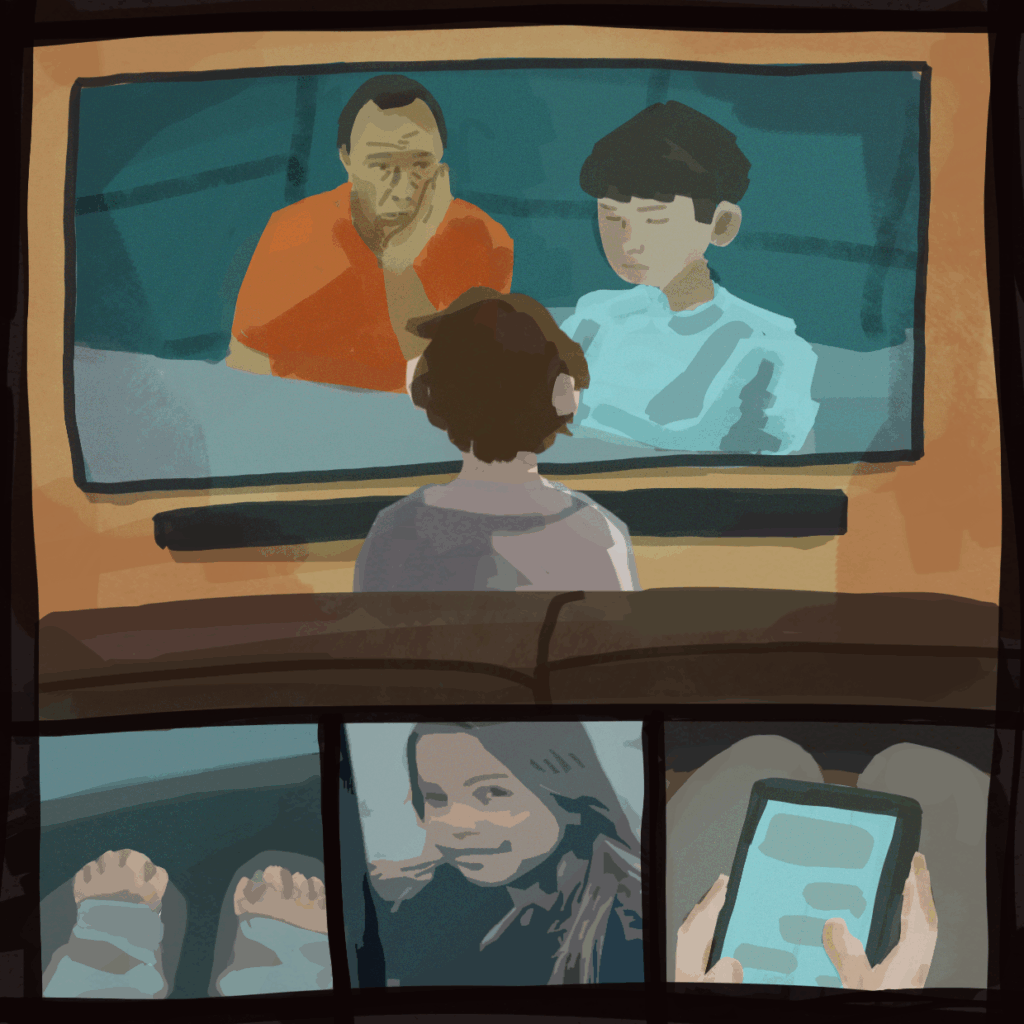
The TV show “Adolescence” debuted on Netflix on March 13, 2025, and has since amassed a whopping 124 million views, making it the third most-watched series on the platform. The UK crime drama was teenage actor Owen Cooper’s debut, taking on the role of Jamie Miller, a 13-year-old boy accused of murdering his classmate Katie Leonard (Emilia Holiday). The show opens on the morning after the crime and takes the audience along for the ensuing investigation.
In just four hour-long episodes, the skillful actors cover the aftermath of the murder that shocks a small West Yorkshire town’s community. “Adolescence” demonstrates the growing issue of influential social media creators preying upon prepubescent boys’ curiosity about women. The show exposes how influencers feed impressionable kids misogynistic ideals that warp their view of sex, relationships and rejection.
In the show, Jamie crushes on a popular girl at his school, Katie Leonard. However, many boys in Jamie’s year call her a “slag” when nude photographs of Katie are leaked, complicating Jamie’s feelings towards her. His friends regurgitate misogynistic narratives they heard online from male influencers who incite regressive mindsets about female sexuality and dating. The show even references influencers like Andrew Tate by name, whose anti-feminist content sent shock waves throughout social media platforms and impacted many teenagers’ views about women.
Cooper masterfully plays the role of an insecure boy when Katie rejects him even in her moment of vulnerability, a circumstance he believed would make her more “gettable.” Jamie’s shy disposition, childish cadence and truly authentic use of boyish slang makes viewers pity the traumatised child thrown into the interrogation room. However, the audience also sees a full display of his elaborate, pathological lies to law enforcement officers, delivered with arrogance and jarring amusement. Miller’s eyes darken at just the right second, but they soften with misty tears in the presence of his bewildered father (Stephen Graham) with perfect cinematic timing.
This role was intimidating for any 14-year-old actor, especially under the guidance of director Philip Barantini, who is known for his intense one-shot works. A “one-shot” refers to when entire episodes of a show are shot continuously. No two scenes can be stitched together in post-production, so if an actor flubbed a line or broke character, it was the joint decision of cinematographer Matthew Lewis and Barantini as to whether they would restart the take. When covering difficult themes like the ones discussed in this show, this style of cinematography is genius, as the viewer is forced to stay engaged and absorb every frame without the possibility of a break.
The standout episode is the third, aptly titled “Episode 3.” It follows an interview between Jamie and a psychologist (Erin Doherty) who is sent to evaluate his mental state before his trial. During the episode, whenever Jamie proclaims his innocence, he says, “I didn’t do anything wrong” as opposed to “I didn’t do it.” Scriptwriter Stephen Graham included the dialogue to provide a haunting glimpse into Jamie’s rationalization of his crime to show how he believed Katie’s rejection of him was justification enough.
Doherty’s acting is nothing short of Emmy-worthy. Her disbelief at Jamie’s thought process is carefully and intentionally shielded, allowing only a few stunningly timed cracks in her neutrality as Jamie sheds his defensive demeanor. The boy develops a certain fondness for her because she is the first adult in the correctional facility who speaks to him as an equal. However, when the extent of his violent tendencies and unapologetic internalised misogyny is revealed, she ends the interview. At this point, a distraught and physically restrained Jamie asks, “Do you like me?”
She leaves the question unanswered as she sits, paralyzed by the 13-year-old’s words. The question speaks volumes about the root of sexist rhetoric online — a desire to receive female attention stemming from internal feelings of inadequacy and loneliness.
Doherty’s performance tears the audience to shreds as she portrays a woman sworn to professional integrity who feels internally destroyed looking at the boy sitting across from her. She is torn between providing him with false comfort and remaining an impartial evaluator.
The sole criticism of this show would be the purposeful exclusion of Katie and her family as characters. She is seen in the videographic evidence of her stabbing, but otherwise is only mentioned briefly by other characters. While this was intended to be a cinematic decision that brings focus to her life by emphasising how it was heartlessly stolen from her, Katie’s absence can be perceived as taking the spotlight away from the victim and instead giving infamy and attention to her killer. The lack of a proper background can lead to audiences feeling less moved by her death as there is no opportunity to build an emotional attachment.
The final episode surprisingly doesn’t include Jamie at all, but instead follows a day in the life of his family after his imprisonment. It depicts a perfectly normal and loving family, wrecked at the knowledge of their son’s cold-bloodedness. The director deliberately shirks the overused storyline of an abusive upbringing to show that violent tendencies aren’t products of toxic households exclusively. In today’s world, it is important to be cognizant of all the factors that come into play with unregulated access to the Internet.
Around a week after the show’s release, Netflix released a video on its YouTube channel packed with exclusive interviews of the cast and crew. Actor Stephen Graham shared the real-life heartbreaking stories that inspired Jamie’s character, reaffirming that the production was a documentary of many recent incidents pieced together. The team of cinematographers explained the painstaking yet rewarding process of shooting one-take episodes, emphasising the crucial role of on-screen chemistry and weeks of rehearsal. Barantini said he hopes the show will act as a bridge to create open conversations between parents and children.
“We’re not trying to give answers,” Barantini told viewers. “Or lay blame, particularly, but it’s a really complicated time, and we need to be talking about these things.”
